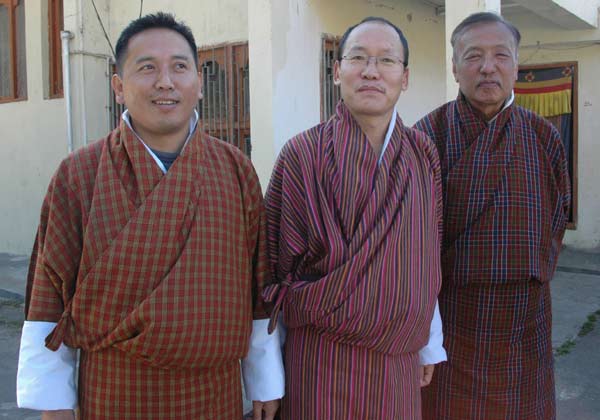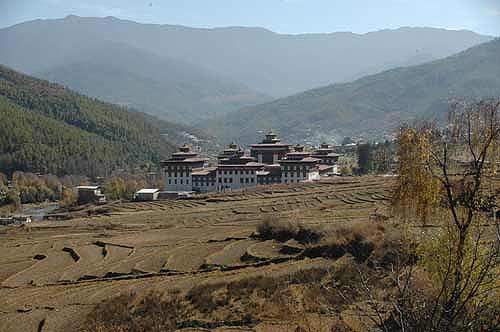SWEDISH SOUTH ASIAN STUDIES NETWORK
Vist to the Centre for Bhutan Studies, Monday 28 November 2005
Web page: http://www.bhutanstudies.org.bt/
E-mail address: cbs@druknet.bt
 |
| Senior researcher Karma Galay, Director Karma Ura, and member of the Council of CBS Dasho Megraj Gurung at the Centre for Bhutan Studies in Langjophakha, Thimphu. |
This is the centre that organised our visit to Bhutan through Mr. Karma
Galay who is senior researcher there.
We were received in Langjophakha, the area in which the Centre is located,
by Mr. Karma Ura, who is the Director of
the centre since its start in 1999. Present at the meeting was also Mr.
Dorji Penjore, researcher in languages (whom
Staffan had met in a Delhi conference in February 2005).
This is at moment the only institution which carries out research in Bhutan in a focussed way. The Royal University of Bhutan, see separate report, has only recently taken up research in a few areas. The centre is doing studies of government development programmes and provides feedback for their improvement. It undertakes ‘inter-disciplinary studies of Bhutan in its social, cultural, and economic aspects focussing largely on contemporary issues.’ It also supports basic research by other agents in Bhutan and acts a clearing-house of information on various studies by others. It hosts foreign scholars who do research or come to lecture.
The centre has also started to publish research reports and it publishes the bi-annual Journal of Bhutan Studies. A list of 45 research reports is available with us. They cover issues in economics, government, social structure, culture, Buddhist traditions, historical research on various areas in Bhutan, youth studies, etc. The academic background of the research staff is in public administration, economics, languages, and political and cultural studies. More information on the publications from CBS.
Index for Gross National Happiness
The term Gross National Happiness (GNH) was coined by Bhutan's King
Jigme Singye Wangchuck, when he ascended the throne in 1972. It signalled
his commitment to building an economy that would serve Bhutan's unique
culture permeated by Buddhist spiritual values.
Today, the concept of GNH resonates with a wide range of initiatives,
across the world, to define prosperity in more holistic terms and to measure
actual wellbeing rather than consumption. By contrast the conventional
concept of Gross National Product (GNP) measures only the sum total of
material production and exchange in any country. Thus an international
conference on Gross National Happiness, hosted by the Bhutan government
in the capital city of Thimphu in 2004, attracted 82 eminent participants
from 20 countries. More
information on GNH in an article by Indian journalist Rajni Bakshi,
posted on Alternet/Envirohealth, 25 January 2005.
A central theme for research at the Ceentre for Bhutan Studies as instructed by the Government is to work out an index for Gross National Happiness, and make it measurable. The index should have the following dimensions:
• Living standard
• Health
• Education
• Eco-system vitality and biodiversity
• Community vitality and interdependence
• Good governance
• Cultural resilience and diversity
• Time use and balance (margin of leisure time available)
• Emotional well-being
We discussed the good governance issue, and found out that it could be operationalised at the local as well as national level. One aspect is corruption, where the CBS researchers meant that this was sensitive and could not really be dealt with by foreign scholars due to its inherent national ethical character and the sensitivity of the information collected. Otherwise CBS welcomed foreign collaboration in constructing the index. We also agreed that several disciplines would have to be involved.
We then discussed the gender equality issue. With the modernisation started about 40 years ago, women got education also on the higher levels and were free to join the government administration, higher institutions and also work as professionals. There were little in the way of formal obstacles to this and many women now work in these spheres. However, women here as elsewhere face constraints connected to child birth and family obligations. On the other handed, the extended family system allows for a great many relatives who can take care of the children when the parents are working. Even so, career women have fewer if any children. It is also so that the extended family system is declining in urban areas.
Sensitive issues
 |
| The centre of power in Bhutan, the dzong in Thimphu housing the offices of the King as well as of the Chief Abbot (Je Khenpo) who is chosen from among the most learned lamas of the country. |
CBS is undertaking quite a few economic studies directly for the government.
Many of these are however not published due to the sensitive information
sometimes dealt with.
Regarding the Lhotshampa refugee problem, relating to the six southern
districts of Bhutan, CBS is not involved in any studies about this. There
are already so many studies of them by Nepalese scholars, is an argument.
Anyway, the ongoing negotiations will allow a proportion of the refugees
with legitimate rights to return to Bhutan, others will have to stay on
in Nepal or find a place in the rest of the world (that is, those who
did commit crimes during the agitation, etc.).
We discussed the issue of cultural pluralism. The population of Bhutan
is small, but there are many groups with different languages, cultures
and origins in the different regions. On the other hand, the Tibetan Buddhist
tradition is very strong. So is there unity in diversity after all? CBS
researchers had the view that diversity is an important asset to national
strength and creativity and should be strived for.
WTO and the risk of mass tourism
A final point of discussion was about Bhutan joining the World Trade Organisation, WTO. The current government seems bent on joining fairly soon, but the CBS researchers were not so convinced about the merits of joining. The Bhutanese economy is rather self-contained. Exports are mainly based on local advantages, like that of hydroelectric power and cement to India. None of these represent a global good. The only engagement in global good production is tourism. If the country joins the WTO, mass tourism would probably follow, a phenomenon which they argue would undermine the special character of Bhutan within a generation. Perhaps you can ride the tiger for a short while, but what about the day after tomorrow?
We also discussed possible collaboration with Swedish researchers. A PhD candidate from the Department of Religious Studies, Göteborg University worked till 2002 in Bhutan on a project called ”Field studies in the religious life of ordinary Bhutanese in a time of transition”, but currently there are, as far as we know, no Swedes engaged in Bhutan studies. So it would have to be to start from scratch to find interested partners in Sweden. We promised to try, given that they write to us about their interests in this, based on Swedish competence in various fields.
After the formal meeting we were invited to Mr. Karma Ura’s house for a delicious lunch with traditional Bhutanese dishes. We also came to see an art project that Karma Ura is presently undertaking. He is a painter as well, and he has just started to work on a big wall painting with religious motives that eventually will be given to a Buddhist monastery.
SASNET - Swedish South Asian Studies Network/Lund
University
Address: Scheelevägen 15 D, SE-223 70 Lund, Sweden
Phone: +46 46 222 73 40
Webmaster: Lars Eklund
Last updated
2011-01-11
